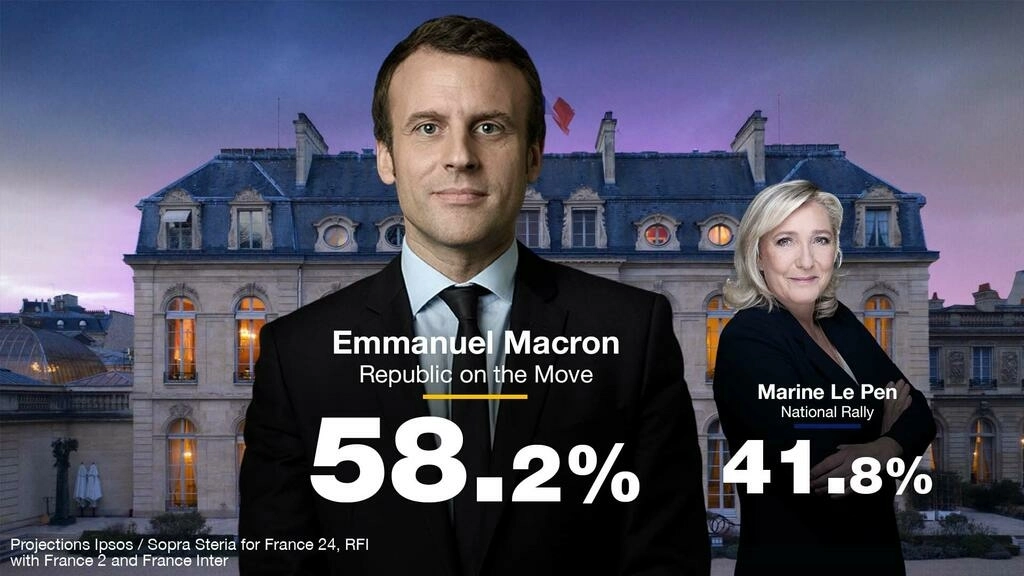
The pro-European centrist Emmanuel Macron has won a second term as French president, becoming the first leader to win re-election in France for 20 years, after a bruising campaign in which he beat the far-right’s Marine Le Pen by a decisive 58.2% to 41.8%, according to initial projected results.
Macron, who is to address supporters in a victory rally at the foot of the Eiffel Tower, beat Le Pen with a lower margin than the 66% he won against her in 2017. Turnout was also lower than five years ago, with abstention estimated at 28%.
Le Pen succeeded in delivering the far right its biggest-ever score in a French presidential election, after campaigning on the cost of living crisis, and promising a ban on the Muslim headscarf as well as nationalist measures to give priority to native-French people over others for jobs, housing, benefits and healthcare.
During a frantic final two weeks’ campaigning, Macron had travelled to town squares across France to shake off what he felt was the unjustly persistent tag of a being an aloof “President of the Rich”. He had promised to dedicate the next five years to restoring France to full employment, arguing that his policies such as loosening French labour laws had already succeeded in creating jobs and that he would definitively put an end to the nation’s decades of mass unemployment.
But although Macron has promised his own swift new package of laws to address the cost of living crisis and tempered his time-frame for raising the retirement age, he ultimately focused far less on his own manifesto in the final days and more on stopping what he called the “unthinkable”: the far-right, anti-immigration Le Pen taking the helm in France, the eurozone’s second biggest economy and a nuclear power.
Macron had described the final days of his re-election campaign as a “battle for Europe” against the eurosceptic Le Pen. He will use his win to bolster his push for an increased European Union defence project, closer EU collaboration on immigration and more regulation to counter the weight of giant tech platforms such as Google. France holds the rotating European council presidency until the end of June.
Macron had framed the choice between himself and Le Pen as “a referendum on Europe, ecology and secularism” and said the far-right leader’s demands for EU treaty change would have seen France pushed out of the bloc. He called her a “climate-sceptic” and said her plan to ban the Muslim headscarf from all public places, including the street would breach the French constitution and religious liberties, and would spark “a civil war”.
Macron accused Le Pen of being financially “dependent” on Vladimir Putin’s Russia, after she took out a Russian loan for her party in 2014, and said her ties to the Kremlin and would have been a dangerous choice a the time of war against Ukraine. She had said that “fear was the only argument he had left”.
- Chamisa under fire over US$120K donation
- Mavhunga puts DeMbare into Chibuku quarterfinals
- Pension funds bet on Cabora Bassa oilfields
- Councils defy govt fire tender directive
Keep Reading
But Macron knew that, after campaigning to stop Le Pen, his support at the ballot box would reflect as much the rejection of the far-right as a clear vote of support for his own programme.
“If the French put their trust in me on April 24, I know full well … that there will be a part of the people who voted for me who would have done it to block the Front National,” he had told the TV programme, Quotidien, deliberately using the former name for Le Pen’s party, now re-named the National Rally. “And so it won’t mean they have given me a blank cheque and that they support and find brilliant every point of my programme.”
A significant number of the 7.7 million first-round voters for the radical left’s Jean-Luc Mélenchon, who narrowly missed reaching the final, had said they felt torn over abstaining or voting to keep out Le Pen.
Macron had leaned to the left in the final days to try to court Mélenchon voters, promising to speed up measures against climate change and expand environmental policy. His first task is to appoint a new prime minister, who he has promised would be specifically devoted to addressing climate change.
The focus will now shift to the parliamentary elections in June, where Macron will seek to get a majority for his centrist grouping, possibly expanding alliances to the right. He had promised a “big new political movement” and could go as far as re-branding his party, La République En Marche. Both Le Pen and Mélenchon are seeking to increase their parties’ lawmakers.
For his first step, Macron has promised to introduce a package of measures to ease the pressure of the cost of living crisis, before the summer, including continuing caps on gas and energy prices. -The Guardian











